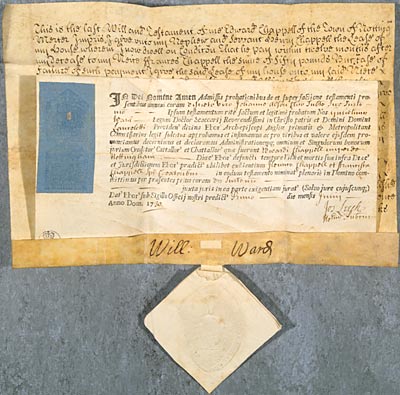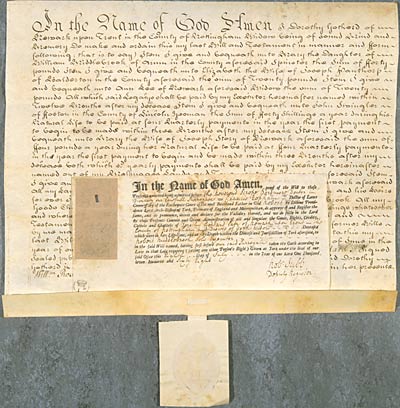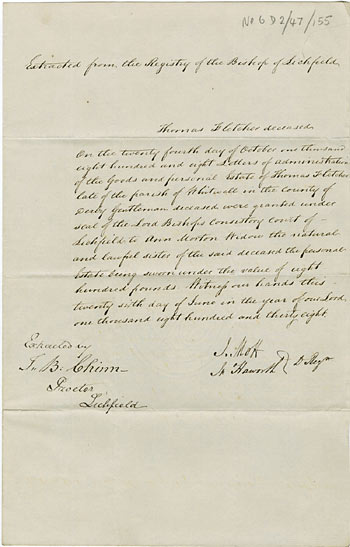Will
Before 1925, wills which dealt with real property were regarded as title deeds in their own right, and formed a crucial part of the evidence proving title to a particular estate or piece of land. This is why many copy wills are found in estate collections.
Purpose
Legal document stating what should happen to the testator's possessions after their death.
Features of wills
Wills appear in a wide range of formats. Wills can be found on parchment or paper, depending on whether they are originals or copies. They are likely to be in Latin until the 16th century. Probate certificates were always in Latin until 1733.
Important words and phrases
A 'Last Will and Testament' was made by a 'testator' ('testatrix' if female).
Technically real estate, or land, was always 'devised'.
'Goods and chattels', or personal estate, was always 'bequeathed'.
This represents the medieval distinction between wills, which dealt with real estate, and testaments, which dealt with personal estate. The distinctions between wills and testaments, and 'devise' and 'bequeath' became blurred over time.
There were a number of conditions which had to be met in order to achieve a legal will before 1925:
- It had to be in writing
- It had to name at least one 'executor' ('executrix' if female) who would take responsibility for carrying out the provisions of the will
- It had to be signed and sealed by the testator. Each separate page had to be signed
- There had to be three witnesses to the signing
- It had to be the last will made by the testator before he died, unless there was evidence of tampering or coercion. Testators who changed their mind about the provisions in their will could either draw up an entirely new one, or add a 'codicil', which had to be dated and witnessed
- It had to be proved, that is authenticated by a legal authority. The word for the process of proving a will is 'probate' (from the Latin 'probatum' = proved). Until 1858, probate was carried out by the church and by certain manorial courts. After 1858, it was carried out by civil District Probate Registries.
Wills exist in a number of forms:
Original will. These can be identified by the signatures of the testator on each page. Most original wills were sent to be proved after the death of the testator, and are now held in large probate collections at various places including local county record offices, the National Archives and District Probate Registries. However, stray original wills can also appear in family and estate collections in other archive repositories. Most of these original wills were probably old wills which were superseded before the testator's death but never actually destroyed. Some have had their signatures and seals cut out in order to make them void. Further advice on accessing original wills is available through The National Archives' research guide relating to wills.
Probate copy will. This is a copy of the original will. When the will was sent to the probate court or registry to be proved, it was copied into a register. A certified copy of the entry was written out by a clerk for the executor to take away with him. Attached to it was a probate certificate, which was the official authentication and permission allowing the executor to deal with the testator's estate. The probate certificate was written in Latin until 1733. The probate copy sometimes has a probate inventory or valuation of all the testator's goods attached to it.
Extracted will, office copy will, or attested copy will. This is perhaps the most common form of will found in title deed bundles. It is a copy of the will made for reference or to keep with the title deeds as part of the evidence of title. It will usually have been copied from the probate registry by the registrar or a member of his staff, sometimes many years after the will was originally proved.
If a person died 'intestate', that is without leaving a valid will, or if the will could not be authenticated for any reason, the probate court would issue letters of administration (often abbreviated to 'admon.'). These were a formal permission allowing the administrator (usually a relative, appointed by the court) to deal with the deceased person's estate. Some letters of administration had the will attached, even though the will had not been validated.
Nuncupative wills were verbal wills often dictated by very sick people on their deathbeds, who had not had time to call a lawyer to draft a legal will. They were then written down and signed by witnesses who had heard the testator's words.
Examples
Ne D 619 - Probate certificate (Latin), of the will of Edward Chappell of Nottingham, 1 Jun. 1730

View this deed
Transcription:
[line 1] In Dei Nomine Amen Admissis probationibus de et super factione testamenti prae-
[line 2] sentibus annexi coram discreto viro Johanne Abson Cl[er]ico Sub[stit]to sive Sur[rogat]o
[line 3] n[ost]ro Ipsum testamentum rite factum et legitime probatum Nos Gulielmus
[line 4] Ward Legum Doctor Scaccarij Reverendissimi in Christo patris et Domini Domini
[line 5] Lancelotti Providen[tia] divina Ebor[acensis] Archiepiscopi Angliae primatis & Metropolitani
[line 6] Commissarius legit[ime] fulcitus approbamus et insinuamus ac pro viribus et valore ejusdem pro-
[line 7] nunciamus decernimus et declaramus Administrationemq[ue] omnium et Singulorum bonorum
[line 8] jurium Creditor[um] Cattalor[um] et Chattalor[um] quae fuerunt Edwardi Chappell nuper de
[line 9] Nottingham Dioec[ensis] Ebor[acensis] defuncti tempore Vitae et mortis suae infra Dioec[esim]
[line 10] et Jurisdictionem Ebor[acensis] praedict[as] ubilibet exttientium [printing error for existentium] Henrico Chappell et Franciscae
[line 11] Chappell Spr' [spinster] Coex[ecu]toribus in eodum [printing error for eodem] testamento nominat[is] plenarie in Domino com-
[line 12] mittimus per praesentes prius coram d[i]c[t]o Sur[roga]to n[ost]ro
[line 13] juxta juris in ea parte exigentiam jurat' (Salvo jure cujuscunq[ue])
[line 14] Dat[um] Ebor[aci] sub Sigillo Officij nostri predict[i] Primo die mensis Junij
[line 15] Anno Dom[ini] 1730
Jos. Leech
No[ta]rius Pub[li]cus
Translation:
In the Name of God Amen: proofs of and upon the making of the testament annexed to these presents having been admitted before the Reverend John Abson, Clerk, our Substitute or Surrogate, we, William Ward, Doctor of Laws, lawfully supported Commissary of the Exchequer of the most Reverend Father and Lord in Christ, Lancelot, by divine providence Lord Archbishop of York, Primate of England and Metropolitan, do approve of and register the same testament, by custom made and legitimately proved, and do pronounce, decree and declare for the virtue and validity thereof, and we do fully in the Lord by these presents commit administration of all and singular the goods, rights, credits, cattle and chattels which belonged to [literally “were of”] Edward Chappell late of Nottingham in [literally “of”] the Diocese of York, deceased, being in his lifetime and at his death anywhere within the aforesaid diocese and jurisdiction of York, to Henry Chappell and Frances Chappell, spinster, co-executors named in the said testament, they having first before our said Surrogate sworn according to Law in that case required (saving any other person's right). Given at York under the seal of our aforesaid Office on the first day of the month of June in the Year of our Lord 1730.
Ne D 3075 - Probate copy will of Dorothy Goddard of Newark, Nottinghamshire, made 30 Jun. 1762, with probate certificate, 8 Jul. 1768

View this deed
Transcription:
In the Name of God Amen I Dorothy Gotherd of Newark upon Trent in the County of Nottingham Widow being of sound Mind and Memory Do make and ordain this my last Will and Testament in manner and form following (that is to say) Item I give and bequeath unto Mary the Daughter of William Middlebrook of Arum [Averham] in the County aforesaid Spinster the Sum of Forty pounds Item I give and bequeath unto Elizabeth the Wife of Joseph Panthorp of Balderton in the County aforesaid the sum of Twenty pounds Item I give and bequeath unto Ann Lee of Newark aforesaid Widow the sum of Twenty pounds All which said Legacys shall be paid by my Executor hereinafter named within Twelve Months after my decease Item I give and bequeath unto John Swingler of Foston in the County of Lincoln yeoman the Sum of Forty Shillings a year during his Natural Life to be paid at four Quarterly payments in the year the first payment to begin to be made within three Months after my decease Item I give and bequeath unto Mary the wife of Joseph Story of Newark aforesaid the sum of Four pounds a year during her Natural Life to be paid at four Quarterly payments in the year the first payment to begin and be made within three Months after my decease both which s[ai]d yearly payments shall be paid by my Executor hereinafter named out of my Messuages Lands and Tenements in Newark aforesaid Item I give and bequeath unto my Nephew Robert Middlebrook of Newark aforesaid All my Lands and Tenements whatsoever in Newark aforesaid to him and his Heirs for ever I likewise given and bequeath unto the said Robert Middlebrook All my Goods Chattels Ready Money Bills Bonds Stock in Trade and Writeings whatsoever and wheresoever and do make him sole Executor of this my last Will and Testament he paying my Debts Legacys and Funeral Expences (revoking all former Wills by me made) In Witness whereof I the said Dorothy Gotherd have to this my last Will and Testament set my Hand and Seal the Thirtieth Day of June in the year of our Lord One Thousand Seven Hundred and Sixty two ~ Dor. Goddard. Signed Sealed published and declared to be the last Will and Testament of the said Dorothy Gotherd in the presence of us and witnessed by us at her request and in her presence. Willm Rose, Ann Sharp, Tho. Brown.
[Probate certificate:]
In the Name of God Amen, proof of the Will to these Presents annexed being admitted before the Reverend Scrope Berdmore Doctor in Divinity our lawfull Surrogate we Frances Topham, Doctor of Laws Commissary of the Exchequer Court of the most Reverend Father in God Robert by Divine Providence Lord Arch-Bishop of York, Primate of England and Metropolitan, do approve of and Register the same, and do pronounce, decree and declare for the Validity thereof, and we do fully in the Lord by these Presents Commit and Grant Administration of all and Singular the Goods, Rights, Credits, Cattels and Chattels of Dorothy Goddard late of Newark upon Trent in the County of Nottingham and Diocese of York Widow Deceased which were in her Life-time, and at her Death within the Diocese and Jurisdiction of York aforesaid, to Robert Middlebrook Sole Executor in the said Will named, having first before our said Surrogate taken the Oath according to Law in that Case required (saving any other Person's Right) Given at York under the Seal of our said Office this Eighth Day of July in the Year of our Lord One Thousand Seven Hundred and Sixty Eight.
Rob. Jubb
Deputy Register
Ne 6 D 2/47/155 - Office copy letters of administration of the effects of Thomas Fletcher [deceased], 24 Oct. 1808; 26 Jun. 1838

View this deed
Transcription:
Extracted from the Registry of the Bishop of Lichfield.
Thomas Fletcher deceased
On the twenty fourth day of October one thousand eight hundred and eight Letters of Administration of the Goods and personal Estate of Thomas Fletcher late of the parish of Whitwell in the County of Derby Gentleman deceased were granted under seal of the Lord Bishops Consistory Court of Lichfield to Ann Morton Widow the natural and lawful sister of the said deceased the personal Estate being sworn under the value of eight hundred pounds. Witness our hands this twenty sixth day of June in the year of our Lord one thousand eight hundred and thirty eight.
J. Mott }
Jno Haworth } D[eputy] Regi[ste]r
Extracted by
T.B. Chinn
Proctor
Lichfield
Next page: Letter of attorney